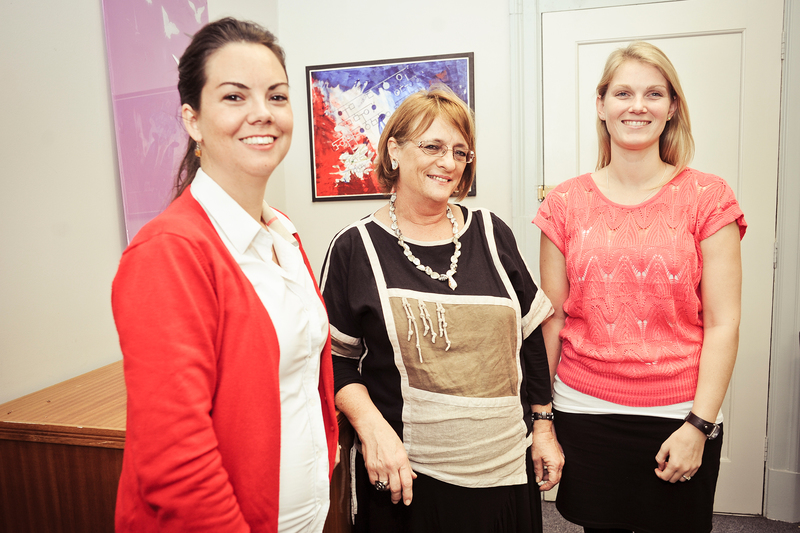Lack of genetic counselling posts costs dearly
24 May 2013 | Story by Newsroom
Funding for vital genetic counselling services in the Western Cape (WC) will have dried up by the end of 2013 unless urgent plans are made to secure funding for these posts, says UCT's Professor Jacquie Greenberg.
Presently, the Province has only three part-time, one-year contract posts; these being at Groote Schuur, the Red Cross Children's War Memorial and Tygerberg Hospitals.
"All of these contracts will expire by the end of 2013, after which there is no foreseeable renewal," said Greenberg, from UCT's Faculty of Health Sciences' Department of Clinical Laboratory Sciences in the Division of Human Genetics.
Genetic counselling is an integral part of healthcare service provision. It's estimated that roughly one in 19 South Africans has a genetic disorder, with a further one in 59 suffering from teratogenic consequences ( congenital malformations, growth retardation, or delayed mental development) of intrauterine exposure to infections, drugs/toxins, and importantly, alcohol. This is a very common teratogen, and about up to 8.8% of children born in the province have foetal alcohol syndrome.
"Tragically, there is no immediate, sustainable funding for a comprehensive genetic counselling service in the Western Cape," said Greenberg. "This is an extremely unstable situation in which genetic counsellors, who form an important part of the clinical genetic service, remain in temporary employment. This has resulted in a lack of job security and career-path prospects, and total demoralisation. The predictable consequence is the loss of all our carefully trained genetic counsellors, which would be disastrous."
Too few counsellors
The UK report Clinical Genetics Services into the 21st Century (1996) recommends eight genetic counsellors per million people for developed countries. In contrast, the suggested Genetic Service plan for South Africa recommends two genetic counsellors per million, which is in keeping with the World Health Organisation and the US National Society of Genetic Counsellors recommendations.
Roughly, this translates to 11 genetic counsellors for the Western Province alone.
"As a realistic immediate goal, however, the Genetic Service plan for SA has recommended nine genetic counsellors for the 2012 to 2014 period in the WC - triple the number employed at the moment," said Greenberg.
Actress Angelina Jolie's decision to have a preventive double mastectomy has brought inherited disease and the need for sound genetic counselling starkly into the foreground.
According to reports, Jolie's mother died of ovarian cancer; and the discovery that Jolie carries a BRCA1 gene mutation, the gene predisposes women to a much higher risk of breast and ovarian cancer than the average woman and which precipitated Jolie's decision.
It is in these types of situations that genetic counsellors fulfil a vital and valuable role.
From the laboratory to the family
Genetic counsellors perform a valuable role in informing patients and their parents of their genetic risks once a clinical diagnosis has been made. They are health-care professionals registered with the Health Professions Council of South Africa who have specialised degrees (MSc in Genetic Counselling) and experience in medical genetics and counselling. Their work includes analysing family history information, interpreting information about specific disorders, discussing inheritance patterns, assessing and calculating the risk to individuals, and reviewing available options for testing or management with families.
"The results of genetic tests are often complex, with important predictive and familial implications," said Greenberg. "Genetic counsellors are trained to translate complex information into a language that patients can understand and use to make important decisions."
Importantly, once a genetic diagnosis is confirmed, the genetic counsellor informs the patient, the parents, and the siblings of their own risks and the risk to future generations. In addition, the risks for other family members regarding the inherited condition in their family can now also be determined and discussed, so that individuals can make informed decisions regarding their healthcare and future reproduction options.
"Cancer genetic counselling specifically has been shown to have huge benefit in reducing morbidity and mortality, by identifying at-risk family members and offering increased surveillance and risk-reducing options," noted Greenberg. "Another cost-saving factor (as proven by recent studies in the USA) is that genetic counsellors can refer for appropriate genetic testing in a practical and cost-effective way, thereby reducing the costs of tests to patients, medical aids and the Department of Health."
Genetic disorders are not rare
Common genetic disorders in South Africa include prenatal, paediatric and adult onset conditions such as chromosomal anomalies (Down syndrome), single-gene disorders (cystic fibrosis, haemophilia A/B, Huntington Disease), and multi-factorial conditions arising from genetic and environment factors (spina bifida).
Affected individuals span all ages, and nearly all medical disciplines encounter patients affected by genetic disorders.
A case in point
(Compiled by Frieda Loubser)
Every woman in 32-year-old Susan Berry's* mother's generation died of breast cancer in their early 30s. Recently, her 33-year-old cousin was diagnosed with breast cancer. Susan has spent her life worrying about her own fate - and that of her four-year-old daughter.
Her cousin (an affected family member) underwent genetic testing, and a BRCA2 mutation was identified. This meant not having to wonder whether testing could detect the genetic cause (many genes have been associated with breast cancer risk, but only two major genes are tested for on a diagnostic level); her cousin's test confirmed that the cause was detectable.
During the pre-test counselling session, Susan's genetic counsellor discussed the pros and cons of testing, and that her chance of having inherited the mutation was 50% (as she would have inherited one of her mother's two copies of the BRCA2 gene). Possible implications with regard to medical and life insurance also needed to be taken into account.
The implications of finding the mutation were thus:
- a 65 to 80% lifetime risk of breast cancer, compared to a general-population risk of ~10% (the risk any woman has of developing breast cancer in her lifetime); and a 10 to20% risk of ovarian cancer, compared to a general-population risk of 2%;
- the risk of passing on the genetic change to her children; and
- the implications for other family members (including the implications for a male family member's risk of prostate cancer or male breast cancer). A limitation is that geneticists can predict an increased risk for breast cancer, but can't say whether someone will or will not develop cancer, nor when it will present.
Susan decided to pursue genetic testing for the specific mutation identified in her cousin (having confirmed that the team was "fishing in the correct pond").
Susan tested negative.
The test showed that the she had not inherited the high-risk genetic change in the BRCA2 gene, the root of the family history of breast cancer. Importantly, Susan cannot pass the genetic change on to her daughter - or any other children or grandchildren as she does not have the gene herself.
(*Not her real name.)
 This work is licensed under a Creative Commons Attribution-NoDerivatives 4.0 International License.
This work is licensed under a Creative Commons Attribution-NoDerivatives 4.0 International License.
Please view the republishing articles page for more information.










